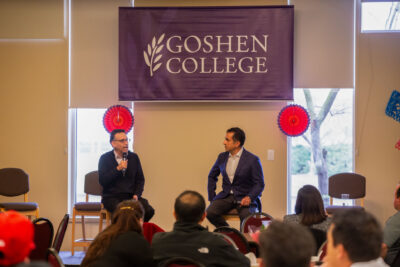An orange plastic mesh fence simulating the Israel-Palestine wall ran through Goshen's campus on Thursday and Friday of last week. Students and staff discussed the impact of this wall project at a talk-back session on Tuesday, March 15.
Overall, the committee in charge of planning the wall project received positive feedback from students, faculty and staff.
“It was encouraging to see so many students coming together to help build it and put it together,” said Liz Berg, a junior.
While the project may not have directly impacted the situation in Palestine, it did help increase awareness about this conflict that is going on over 6,000 miles away from Goshen. People who volunteered to act as guards reported that some community members, walking their dogs through campus, had no idea why there was a long orange fence running along the sidewalk. This gave the guards the opportunity to talk with people about the situation in Palestine.
“If this wouldn't have happened,” said Noah Weaverdyck, a senior, “I wouldn't have been thinking about it.”
The wall across campus wasn't met with unanimous approval, however. At 3 a.m. on Friday morning Tamara Shantz, apartment manager, got a call from campus security informing her that the wall had been pushed over in one spot.
“I think it was effective in that it inspired discomfort and fear,” said Marcelle Zoughbi, a sophomore, “but ineffective in that people just got angry, instead of thinking, 'poor Palestinians' or 'poor Mexicans.'”
Several people at the talk-back expressed dissatisfaction that students didn't completely understand the parallel between this project on campus and the wall in Israel-Palestine.
“I felt like it was just a campus activity and wasn't connected to the actual wall,” said Becca Yoder, a sophomore.
Some of the people who organized the wall project regretted that some students didn't register the full implications of what it means to live with a wall dividing the different parts of a person's life.
“Some people totally missed the point,” said Zoughbi. “One guy came to me and said, 'Marcelle, what if I was sick and I had to go through?' and I said, 'Exactly.'”
Guards developed arbitrary strategies for who they would keep out and who they would let in. Emily Graber, a senior, chose to estrange people wearing black laced shoes. Weaverdyck didn't allow faculty, who lack the validation sticker on the back of their ID cards, to pass through the wall.
“It was hard to act the part, just because I didn't want to be mean to people,” said Weaverdyck.
Several of the guards expressed that after serving as gatekeepers they could more easily sympathize with guards in Palestine who don't necessarily want to play the role of law-enforcer.
For the most part, people at the talk-back thought that the project illustrated the situation in Palestine aptly. The wall across campus was especially poignant for Zoughbi, who is from Palestine.
“I realized that I was avoiding it subconsciously,” she said. “It brought back memories of anger and oppression.”

